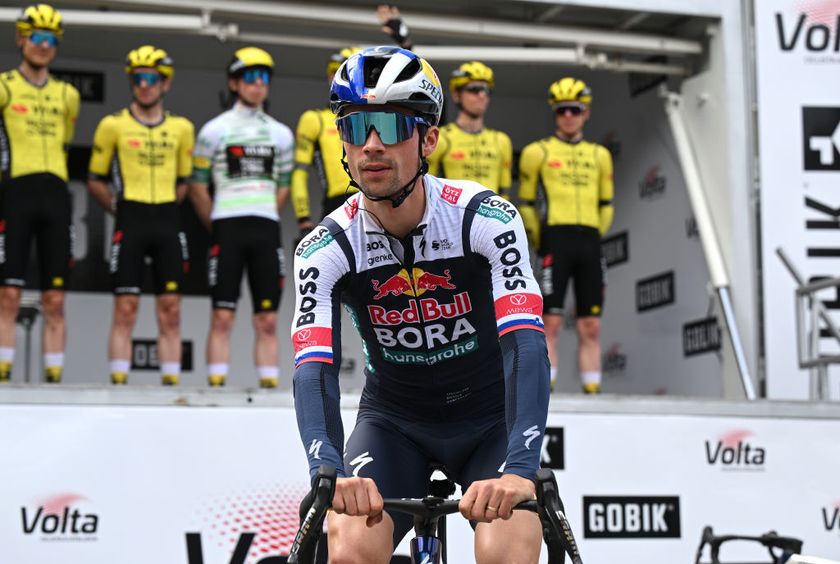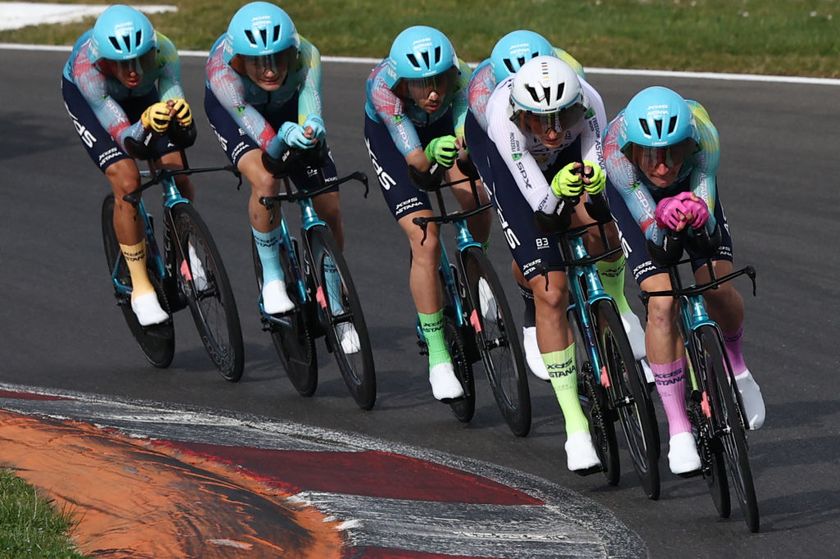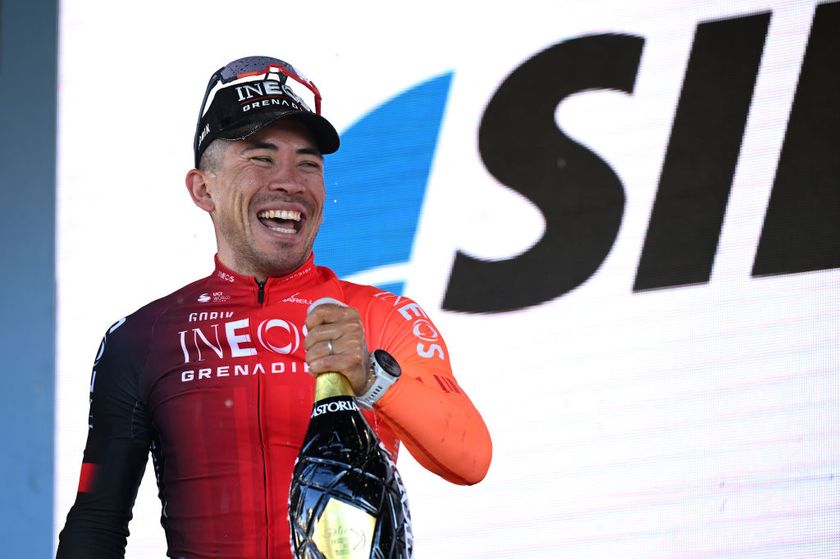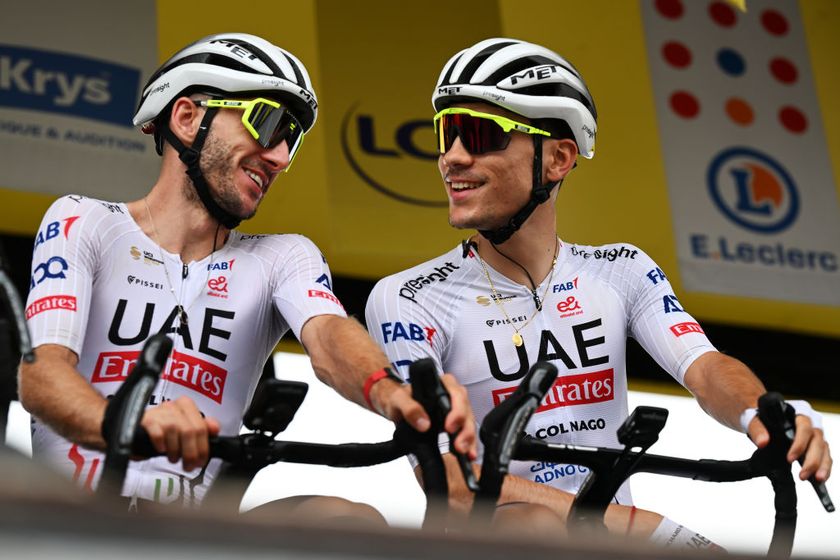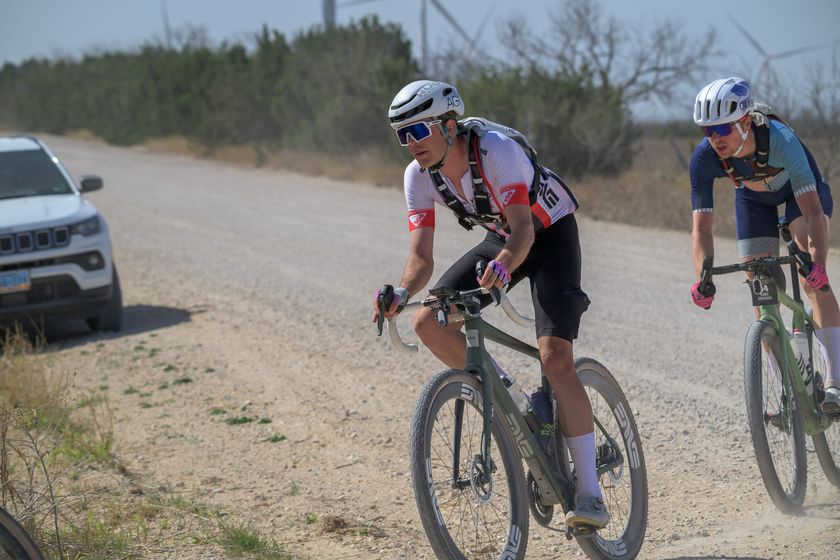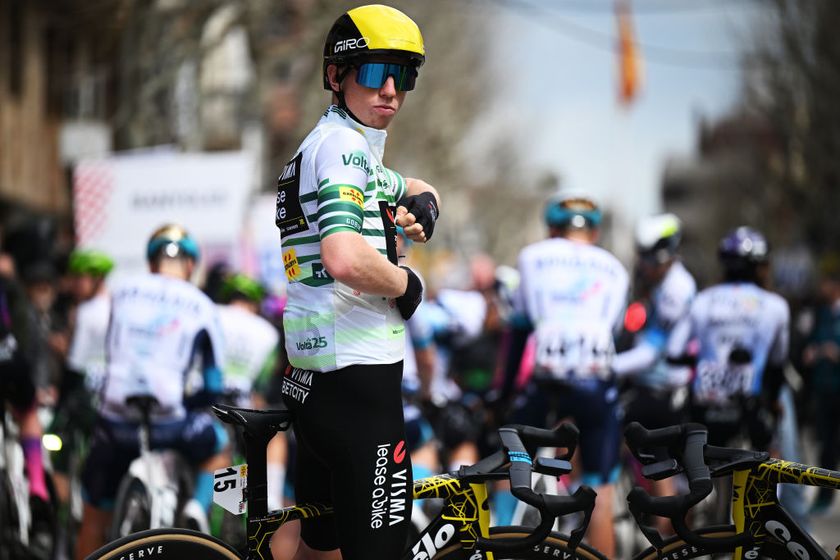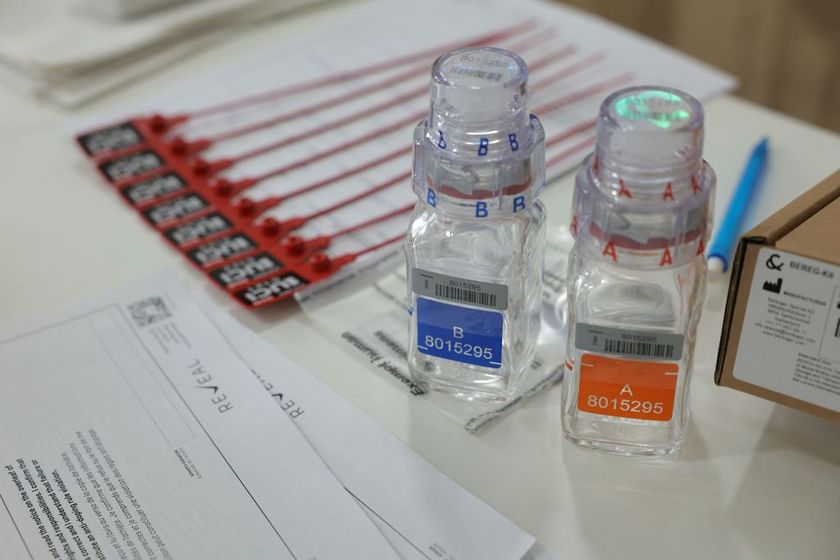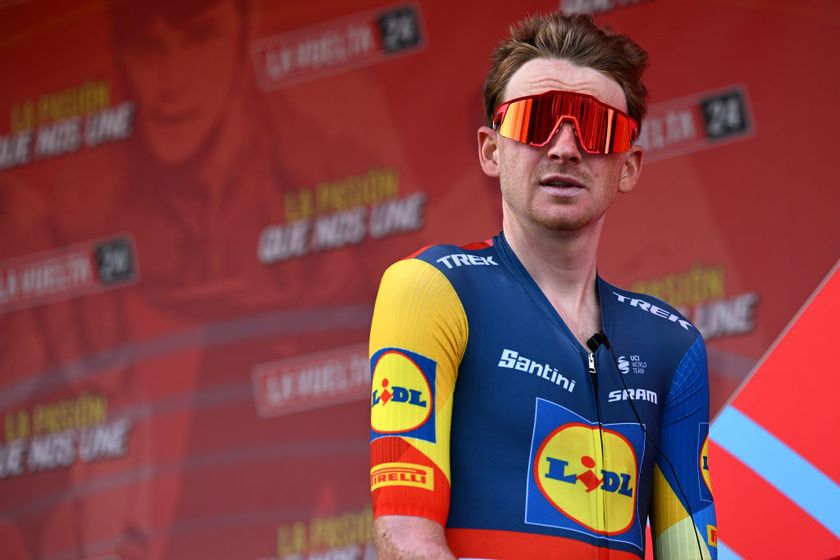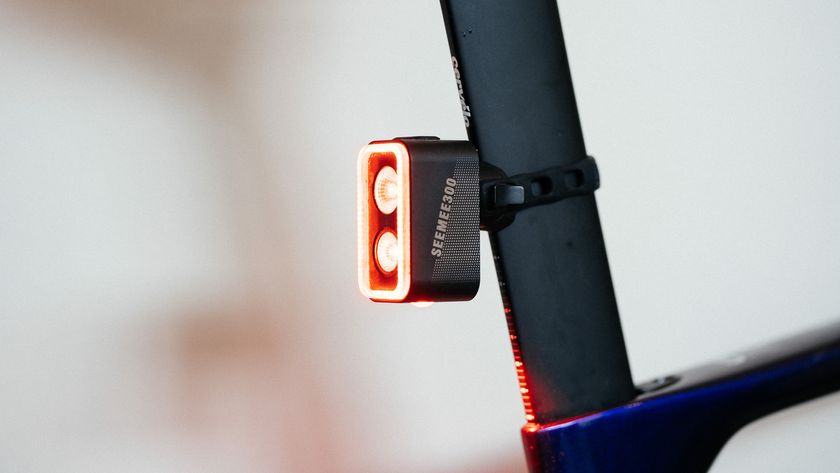Cookson defends Giro d’Italia jury, justifies the UCI’s attempts to withdraw Astana's licence
UCI president upbeat about the fight against doping during visit to the Giro d'Italia








UCI president Brian Cookson has told Cyclingnews that the race judges at the Giro d'Italia were right to penalise Team Sky's Richie Porte for his illegal wheel change during stage 10 to Forli, revealing that as a former race Commissaires, he knew about the rule and the consequences.
Cookson spent Thursday at the Giro d'Italia and spoke to Cyclingnews and Gazzetta dello Sport before following the stage to Vicenza in a VIP car. He was expected to attend an event in Vicenza for the city's bid to host the world road race championships. Before being whisked away for his day in the race car with former Gewiss rider and 1996 Milan-San Remo winner Gabriele Colombo as his driver, Cookson answered a series of other questions, concerning the battle over the Astana's WorldTour licence, the consequences of the CIRC report and Roman Kreuziger's Biological Passport case.
Cookson was criticised by Tour de France winner Vincenzo Nibali for not attending races or regularly speaking to riders. However, he explained that he does not think it would be appropriate for him to be on too friendly of terms with riders and teams. He said he has no plans to "knock on the door of Richie Porte's camper van for a chat."
Cyclingnews: Firstly what's your opinion on Richie Porte (Team Sky) being penalised two minutes for taking a wheel change from Orica-GreenEdge's Simon Clarke?
Brian Cookson: The conduct of the race is in the hands of the race jury and it's not something I'm ever going to interfere with. I think the decision was correct. It was unfortunately for Richie and his team but this is not a new rule, it’s been in the rulebook for decades. It was in there when I qualified as a race commissaire in 1986 and it's still in there. I knew the rule and when I first heard about it, I said 'Oh dear…' I knew what the consequences would be.
Obviously the Giro will be more difficult for Richie now but his race isn't over. He's still got a chance to win the Giro even if it will be more difficult for him. It may well help him to find something extra.
CN: Team Sky manager Dave Brailsford suggested that the jury's decision and the UCI rules do not reflect the sportsmanship of the wheel change. He called for common sense and fairness to prevail. Do you agree?
Get The Leadout Newsletter
The latest race content, interviews, features, reviews and expert buying guides, direct to your inbox!
BC: The reality of a bike race, with a peloton spread over the road, is that the judges don't see everything. However, when I think something happens in a critical point of the race, they don't have any option to apply the rules. You expect the professional teams to know the rules and respect them. If they don't there are consequences, even if it's regrettable.”
CN: Do you think the rule will be changed?
BC: There is a process in place to change the rules and we constantly review them. I don't think it's good to change rules mid-season and certainly not mid-event. This rule is there for a good reason. Perhaps the penalty is severe but it's in the rule book.
CN: A few weeks ago Vincenzo Nibali lamented that he has not seen you at races. Would it not be better for you to attend more races to talk to the riders and teams more often?
BC: I'm always happy to talk to riders and teams but I don't like to impose myself on them at races. We've got structures in place, with riders on the Professional Cycling Council and there's an athletes commission. I don't want to go and knock on the door of Richie Porte's camper van just to have a chat. I don't think that's appropriate.
I'd be happy to talk on the phone to any rider, swap emails or even go to visit teams. However, I don't think it's appropriate for me to be seen to have friends in the sport. I've been accused of having good contacts with Team Sky and British riders. Its true, but I have good contact with other teams too. My job is to be independent and that's the way it should be.
If you are cheating, sooner or later, we will catch you
CN: Can you give us an update on what the UCI is doing after the CIRC report and about the reforms planned for 2017? You seem to have lots of things on your plate at the moment.
BC: I'm not the only person at the UCI of course, we have a good management committee too and good staff. We're looking at lots of issues. We're trying to learn the lessons of the CIRC report, to see what we need to change. Regarding the reforms of professional cycling, we have a Professional Cycling Council meeting in June. I'm optimistic we'll have some final proposal in place that I hope will be accepted at that stage. I don't think the changes will be as dramatic as the proposals were. I favour an evolution, rather than a revolution. I think it's important to respect the heritage of the sport as well as thinking of new opportunities.
I think we can find a solution that is acceptable to all sides. I think there's a general agreement that there are too many days of racing but there are economic reasons for this. I don't think we'd forcibly propose that the Giro d'Italia or the Vuelta is reduced in the number of days. But let's wait and see what is proposed.
A lot has happened in recent months but I actually think there is a much better spirit in the sport now. People are understanding that what happened in the past, can't continue in the future. There will always be cheats but I think things are getting better. We have the new WADA code and new UCI rules that allow sanctions for a team after a second doping offence in 12 months. We can ask Licence Commission for severe fines and even double them. I think were seeing a change in behaviour now.
There may be people who still try to cheat so the tests continue and so does the work of the Cycling Anti-Doping Foundation (CADF), which is independent. I don't know what riders are tested, I don't know if a rider is racing under suspicion or if there's a case about to be open on with them. Now, they also have an investigation capacity too. So they can look for non-analytical doping offences. All that is a message to teams: that if you are cheating, sooner or later, we will catch you. The teams tell me that's a real disincentive and has changed the risk-reward ratio.
We now the highest level of scrutiny in our sport than ever in the past and higher than in any other sport. That's something people forget. Cycling is not the biggest offender in anti-doping in sport. There are other sports worse than cycling. To be honest, I don't really care about that, I care about our sport. We will do everything we can to support clean athletes.
It's a pity that some people, even in the media, still become suspicious when we see a great performance. When a young rider does a great ride, it doesn't mean they must be doping. We have to have confidence in the process.
CN: Wasn't it yourself and the UCI that pointed the finger at Astana?
BC: We were very concerned about how that team was organised and managed. They went back to the Licence Commission with an improved structure and procedures. They had a serious warning and acted upon it. The case is not closed and the Licence Commission can re-open it if they see fit, if there are reason to suspect things aren't right.
CN: Do you regret re-opening the Astana case during the season and do you feel losing the case damaged your reputation?
BC: It's not for me to say what my reputation is, others can make that judgement. At the end of the day, we're determined to make as strong an effort as we can in the fight against doping, what the nationality of the rider or the team.
I don't regret saying what I did. We had due cause to make those comments. The team responded appropriately according to the Licence Commission and so they can continue to compete. Nobody wants to see innocent riders or teams put out of work, nobody wants to see a team destroyed but equally, the responsibility to comply with the regulations lies with the teams.
CN: Lastly, is the planned UCI anti-doping tribunal, which will deal directly with doping cases instead of national federations, active? You said last month that it was a matter of a few weeks.
BC: It's in place and we will act when there is an appropriate case to deal with.
CN: Roman Kreuziger's case is due to be heard soon. Do you think the outcome of the case will affect the Biological Passport?
BC: That's coming up before CAS very soon, so I'm not going to comment on it. Let's see what happens.
With that, Cookson was taken away by RCS Sport to spend his day at the Giro d'Italia.
To subscribe to the Cyclingnews video channel please click here.

Stephen is one of the most experienced member of the Cyclingnews team, having reported on professional cycling since 1994. He has been Head of News at Cyclingnews since 2022, before which he held the position of European editor since 2012 and previously worked for Reuters, Shift Active Media, and CyclingWeekly, among other publications.
